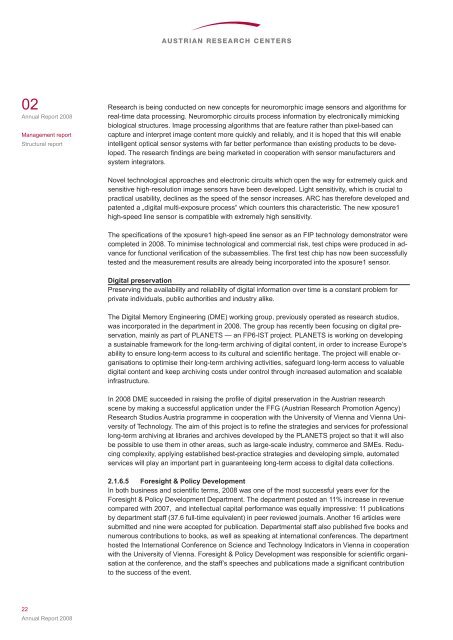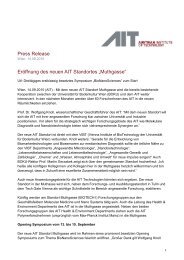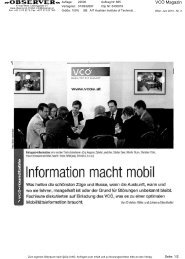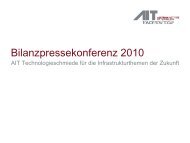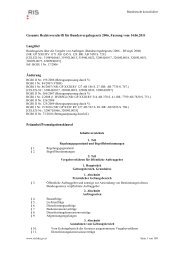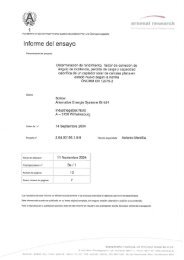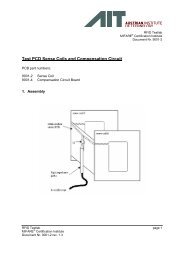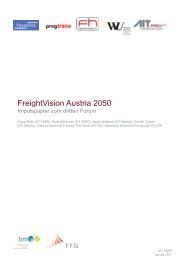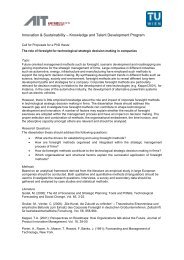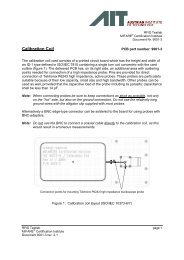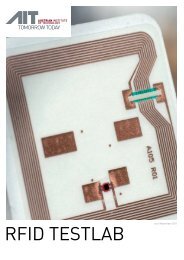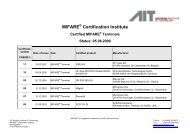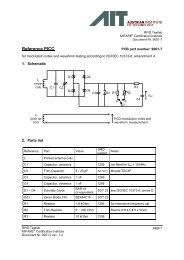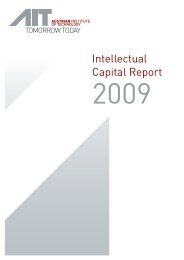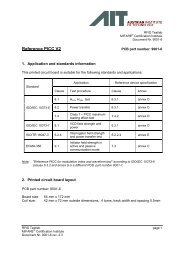Shareholders, Supervisory Board and management bodies ...
Shareholders, Supervisory Board and management bodies ...
Shareholders, Supervisory Board and management bodies ...
You also want an ePaper? Increase the reach of your titles
YUMPU automatically turns print PDFs into web optimized ePapers that Google loves.
02<br />
Annual Report 2008<br />
Management report<br />
Structural report<br />
22<br />
Annual Report 2008<br />
Research is being conducted on new concepts for neuromorphic image sensors <strong>and</strong> algorithms for<br />
real-time data processing. Neuromorphic circuits process information by electronically mimicking<br />
biological structures. Image processing algorithms that are feature rather than pixel-based can<br />
capture <strong>and</strong> interpret image content more quickly <strong>and</strong> reliably, <strong>and</strong> it is hoped that this will enable<br />
intelligent optical sensor systems with far better performance than existing products to be developed.<br />
The research findings are being marketed in cooperation with sensor manufacturers <strong>and</strong><br />
system integrators.<br />
Novel technological approaches <strong>and</strong> electronic circuits which open the way for extremely quick <strong>and</strong><br />
sensitive high-resolution image sensors have been developed. Light sensitivity, which is crucial to<br />
practical usability, declines as the speed of the sensor increases. ARC has therefore developed <strong>and</strong><br />
patented a „digital multi-exposure process“ which counters this characteristic. The new xposure1<br />
high-speed line sensor is compatible with extremely high sensitivity.<br />
The specifications of the xposure1 high-speed line sensor as an FIP technology demonstrator were<br />
completed in 2008. To minimise technological <strong>and</strong> commercial risk, test chips were produced in advance<br />
for functional verification of the subassemblies. The first test chip has now been successfully<br />
tested <strong>and</strong> the measurement results are already being incorporated into the xposure1 sensor.<br />
Digital preservation<br />
Preserving the availability <strong>and</strong> reliability of digital information over time is a constant problem for<br />
private individuals, public authorities <strong>and</strong> industry alike.<br />
The Digital Memory Engineering (DME) working group, previously operated as research studios,<br />
was incorporated in the department in 2008. The group has recently been focusing on digital preservation,<br />
mainly as part of PLANETS — an FP6-IST project. PLANETS is working on developing<br />
a sustainable framework for the long-term archiving of digital content, in order to increase Europe‘s<br />
ability to ensure long-term access to its cultural <strong>and</strong> scientific heritage. The project will enable organisations<br />
to optimise their long-term archiving activities, safeguard long-term access to valuable<br />
digital content <strong>and</strong> keep archiving costs under control through increased automation <strong>and</strong> scalable<br />
infrastructure.<br />
In 2008 DME succeeded in raising the profile of digital preservation in the Austrian research<br />
scene by making a successful application under the FFG (Austrian Research Promotion Agency)<br />
Research Studios Austria programme in cooperation with the University of Vienna <strong>and</strong> Vienna University<br />
of Technology. The aim of this project is to refine the strategies <strong>and</strong> services for professional<br />
long-term archiving at libraries <strong>and</strong> archives developed by the PLANETS project so that it will also<br />
be possible to use them in other areas, such as large-scale industry, commerce <strong>and</strong> SMEs. Reducing<br />
complexity, applying established best-practice strategies <strong>and</strong> developing simple, automated<br />
services will play an important part in guaranteeing long-term access to digital data collections.<br />
2.1.6.5 Foresight & Policy Development<br />
In both business <strong>and</strong> scientific terms, 2008 was one of the most successful years ever for the<br />
Foresight & Policy Development Department. The department posted an 11% increase in revenue<br />
compared with 2007, <strong>and</strong> intellectual capital performance was equally impressive: 11 publications<br />
by department staff (37.6 full-time equivalent) in peer reviewed journals. Another 16 articles were<br />
submitted <strong>and</strong> nine were accepted for publication. Departmental staff also published five books <strong>and</strong><br />
numerous contributions to books, as well as speaking at international conferences. The department<br />
hosted the International Conference on Science <strong>and</strong> Technology Indicators in Vienna in cooperation<br />
with the University of Vienna. Foresight & Policy Development was responsible for scientific organisation<br />
at the conference, <strong>and</strong> the staff’s speeches <strong>and</strong> publications made a significant contribution<br />
to the success of the event.


